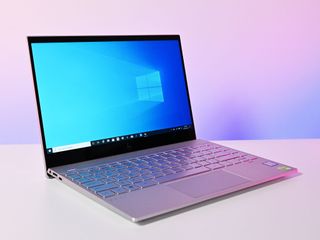Microsoft squeezes out one last cumulative update for Windows 10 before its holiday break
One last cumulative update is available before Microsoft pauses preview releases for the holidays.

What you need to know
- Microsoft released a cumulative update for PCs running Windows 10 version 20H2 or 2004.
- This should be the last preview update that will roll out this year.
- Microsoft is pausing preview releases over the holidays.
Microsoft released new cumulative updates for people running Windows 10 20H2 and 2004. The update is KB4586853 and brings systems running Windows 10 version 20H2 and 2004 to builds 19041.662 and 19042.662, respectively. This should be the last preview release update to roll out this year. Microsoft announced last month that it is pausing preview releases for the month of December, so it rolled one last update out before November ended.
Here are the highlights for what's new in the builds, as outlined by Microsoft:
- Updates an issue that causes Narrator to stop responding after you unlock a device if Narrator was in use before you locked the device.
- Updates an issue that prevents you from finding certain Microsoft Xbox consoles on a Windows device.
- Updates an issue that fails to display the Microsoft Xbox Game Bar app controls on supported monitors. This issue occurs in certain Microsoft DirectX® 9.0 (DX9) games that are running with Variable Refresh Rate enabled on these monitors.
- Updates an issue with USB 3.0 hubs. A device connected to the hub might stop working when you set the device to hibernate or restart the device.
- Updates an issue that randomly changes the input focus of edit controls when using the Japanese IME or the Chinese Traditional IME.
- Updates an issue that makes the touch keyboard unstable in the Mail app.
- Improves the visual quality of Windows Mixed Reality headsets that run in lower resolution mode.
- Updates an issue that prevents the PDF24 app, version 9.1.1, from opening .txt files.
Windows 10 versions 20H2 and 2004 have the same list of improvements and fixes:
- Updates Internet Explorer's About dialog to use the standard modern dialog.
- Addresses an issue that causes Narrator to stop responding after you unlock a device if Narrator was in use before you locked the device.
- Addresses an issue that fails to display the local account groups in the localized language even after you deploy the language pack.
- Addresses an issue that prevents a user from finding certain Microsoft Xbox consoles on a Windows device.
- Addresses an issue that displays a black screen to Windows Virtual Desktop (WVD) users when they attempt to sign in.
- Addresses an issue with a certain COM API that causes a memory leak.
- Addresses an issue that fails to display the Microsoft Xbox Game Bar app controls on supported monitors. This issue occurs in certain Microsoft DirectX® 9.0 (DX9) games that are running with Variable Refresh Rate enabled on these monitors.
- Addresses an issue that prevents the touch keyboard from opening in Universal Windows Platform (UWP) apps when USB devices are connected.
- Addresses an issue with USB 3.0 hubs. A device connected to the hub might stop working when you set the device to hibernate or restart the device.
- Addresses an issue that crops the touch keyboard when you use a Remote Desktop Connection on a device that has a different screen resolution.
- Addresses an issue with excessive network traffic that occurs when you use the Open File dialog box in File Explorer and browse to a shared folder that has the Previous Version feature available.
- Addresses an issue that causes the ImmGetCompositionString() function to return the full-width Hiragana when using the Microsoft Input Method Editor (IME) for Japanese instead of returning the half-width Katakana.
- Addresses an issue that prevents JumpList items from functioning. This occurs when you create them using the Windows Runtime (WinRT) Windows.UI.StartScreen API for desktop applications that are packaged in the MSIX format.
- Addresses an issue that prevents applications from receiving the Shift and Ctrl keystroke events when the Bopomofo, Changjie, or Quick Input Method Editors (IME) are in use.
- Addresses an issue that randomly changes the input focus of edit controls when using the Japanese IME or the Chinese Traditional IME.
- Addresses an issue that prevents you from signing in on certain servers. This occurs when you enable a Group Policy that forces the start of a computer session to be interactive.
- Addresses an issue that fails to set the desktop wallpaper as configured by a GPO when you specify the local background as a solid color.
- Addresses an issue with the Microsoft Pinyin IME that unexpectedly dismisses the candidate pane when you type certain phrases.
- Addresses an issue that fails to send the Shift keyup event to an application when you use the Japanese IME.
- Addresses an issue that renders Kaomoji incorrectly on the emoji panel.
- Addresses an issue that makes the touch keyboard unstable in the Mail app.
- Addresses an issue that enters unexpected characters, such as half-width Katakana, when you type a password while the IME is in Kana input mode.
- Addresses an issue that might fail to pair certain MIDI devices that connect using Bluetooth Low Energy (LE).
- Addresses a runtime error that causes Visual Basic 6.0 (VB6) to stop working when duplicate windows messages are sent to WindowProc().
- Addresses an issue that generates a 0x57 error when the wecutil ss /c: command is used to update an Event Forwarding subscription.
- Addresses an issue that causes applications to fail when they call the LookupAccountSid() API. This occurs after migrating accounts to a new domain whose name is shorter than the name of the previous domain.
- Addresses an issue in which loading a Code Integrity Policy causes PowerShell to leak a large amount of memory.
- Addresses an issue that causes a system to stop working during startup. This occurs when the CrashOnAuditFail policy is set to 1 and command-line argument auditing is turned on.
- Addresses an issue that causes the Microsoft Management Console (MMC) Group Policy application to stop working when you are editing the Group Policy Security settings. The error message is, "MMC cannot initialize the snap-in."
- Addresses an issue that fails to free a system's non-paged pool and requires a restart of the system. This occurs when running 32-bit applications with the Federal Information Processing Standard (FIPS) mode enabled.
- Addresses an issue that might prevent updates from installing and generates an "E_UNEXPECTED" error.
- Addresses an issue that causes the "I forgot my Pin" functionality on the lock screen to fail. This failure occurs if the user has signed in using a username and password and the DontDisplayLastUserName or HideFastUserSwitching policy settings are enabled.
- Addresses an issue that prevents access to Azure Active Directory (AD) using the Google Chrome browser because of a Conditional Access policy error.
- Improves the visual quality of Windows Mixed Reality headsets that run in lower resolution mode.
- Extends Microsoft Defender for Endpoint support to new regions.
- Enables a new Hardware-enforced Stack Protection feature called shadow stacks on supported hardware. This update allows applications to opt in to user-mode shadow stack protection, which helps harden backward-edge control-flow integrity and prevents return-oriented programming-based attacks.
- Addresses an issue in the Microsoft Remote Procedure Call (RPC) runtime that causes the Distributed File System Replication (DFSR) service to stop responding. This issue generates log events for DFS Replication (5014), RPC (1726), and no reconnection (5004) for a default timeout of 24 hours with no replication.
- Adds the touch keyboard to the allowed apps list, and it now works in multi-app assigned access mode.
- Addresses an issue that prevents the PDF24 app, version 9.1.1, from opening .txt files.
- Addresses an issue that might cause a non-paged pool memory leak in some scenarios.
- Addresses an issue that allows an app that has been blocked from hydrating files to continue hydrating files in some cases.
- Addresses an issue that might cause a memory leak in bindflt.sys when copying files in a container scenario.
- Addresses an issue with Active Directory Certificate Services (AD CS) that fails to submit Certificate Transparency (CT) logs when they are enabled.
- Addresses an issue in which cluster validation tests internal switches that are not for cluster use and re-communication.
- Addresses an issue that causes stop error 0x27 when you attempt to sign in to a device that is not in a domain using credentials for a device that is in the domain.
You can check out the full release notes, including all known issues, on Microsoft's support page.
You can download the latest update through Windows Update or manually get them through Microsoft Update Catalog.
Get the Windows Central Newsletter
All the latest news, reviews, and guides for Windows and Xbox diehards.

Sean Endicott brings nearly a decade of experience covering Microsoft and Windows news to Windows Central. He joined our team in 2017 as an app reviewer and now heads up our day-to-day news coverage. If you have a news tip or an app to review, hit him up at sean.endicott@futurenet.com.
